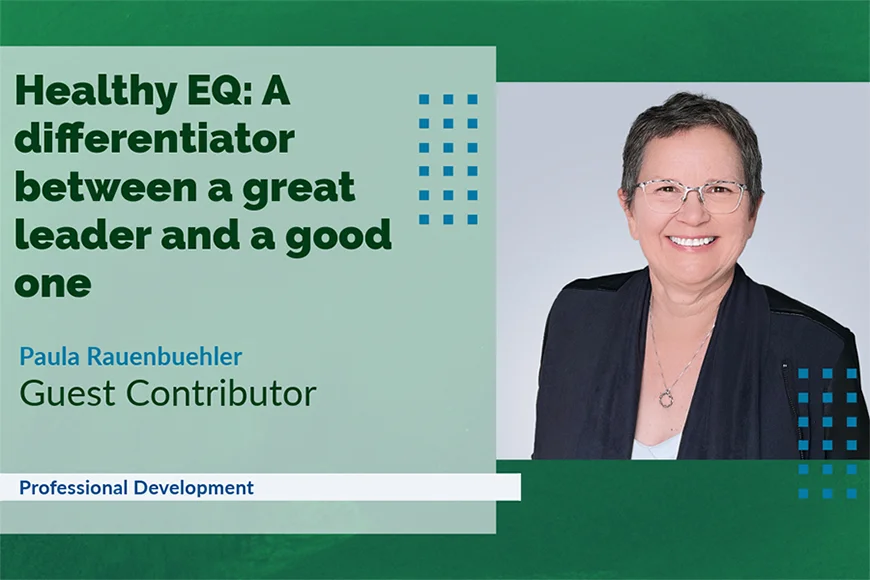
March 5, 2024
I’ll admit — I am a latecomer to the “Suits” series on the Netflix platform.
When it saw a rebirth of sorts last year, I thought, why not see what it is all about?
It has been fascinating to watch it from the perspective of emotional intelligence (or EQ).
From a distance, the Harvey Spector character seems to exhibit an extremely high level of independence and self-regard, but he doesn’t see the importance of more than a few relationships, and he certainly lacks self-control and self-awareness.
His problem-solving skills are keen — but the lack and overuse of some emotional intelligence elements might make them questionable decisions.
His empathy is person-dependent, at times overusing it and other times not using it at all.Whether this makes him a good lawyer, I will let you decide.
It certainly makes for engaging television.
Emotional intelligence is often thought of as empathy, self-awareness and self-expression.
It is these elements and so much more.
Some clarification
Before I go much further, I will offer some data from MultiHealth Systems’ (MHS) research on EQ.
Its decades of work revealed these core components, and their elements, are valid and reliable measures of EQ:
Self-perception — A healthy and realistic view of oneself to include self-regard, self-actualization and emotional self-awareness.Self-expression — How one behaves concerning emotional expression, assertiveness and independence.Interpersonal — To what extent does one interact and relate to others? Elements such as interpersonal relationships, empathy and social responsibility are factors here.Decision-making — The ability to make decisions using emotions and when emotions are high. Problem-solving, reality testing and impulse control come into play here.Stress management — Does someone manage stress well? Concepts of flexibility, stress tolerance and optimism are at play here.
MHS’s and others’ research shows emotional intelligence is a skill that can be learned and that each of these elements has a spectrum associated with behaviors that can either be under or overused.
It is when these elements are out of alignment with the situation and objective that communication and relationships can suffer.
All the research I have seen indicates that a healthy EQ is key to being a great leader versus a good one.
An understanding
While IQ is thought of as fixed and constant throughout someone’s life, EQ is a skill that can be learned and developed.
We learn empathy by seeing it in others and putting it into action ourselves.
We learn how to appropriately express our emotions by watching others.
We have also learned from when we have expressed them inappropriately and suffered some consequences for it.
Ever said, “oh, that wasn’t supposed to be out loud?”
That might have been due to overusing self-expression and not enough impulse control.
Let us revisit “Suits” for more character analysis.
Spector, from my observation and perspective, does display some moments of healthy emotional intelligence.
Most often with the characters Donna, Mike, Jessica and Rachel, while less so with Lewis and people outside of the firm.
His behavior outside of these key relationships demonstrates a misalignment with optimal emotional intelligence, for dramatic effect.
The rants (lack of impulse control and overusing self-expression without self-awareness) and cutting people out of his life (lack of interpersonal relationships and overusing independence) are a few that rise to the surface.
The character of Rachel as a comparison appears to lose her self-regard when it comes to relationships and dials in highly on others, underusing independence.
She does demonstrate reasonable impulse control and empathy.
Thus, her behavior is more even-keeled.
When the elements of EQ are well suited to the situation, hard conversations can be had with more ease for everyone involved while not watered down in their seriousness.
Trust is more likely to be evident and stable within the team when everyone behaves in an emotionally intelligent manner.
Stress can be handled much more easily when EQ is managed.
There are times, however, when one or more elements do need to move to either end of the spectrum.
Parents, for example, sacrifice some of their independence while their children are small.
In a crisis, problem-solving needs to be focused on and actioned perhaps at the expense of flexibility.
Sometimes lack of impulse control can be a good thing — like when someone asks if you want to go out for ice cream and you say “yes” without even thinking.
Or you see someone in need and you act instinctively.
The optimization of EQ is how all these elements work together for the best possible outcome — intentionally tapping into the elements that are needed for the situation.
More is not always better.
The goal is not necessarily perfection as it is the best application of these factors.
Each situation will be unique and deserves some reflection on what is needed now.
Optimizing EQ
Many assessments will measure different elements of EQ.
Depending on the focus of the researcher, some of the elements beyond self-awareness and expression might vary by the researcher.
When I share the results of the assessment I use with clients, I remind them the goal is not to have a score of 100% — that would indicate they are most likely overusing many of the factors.
I invite them to think about whether they are optimizing their EQ.
Using the right measure of these distinct factors to be, and be seen as, the best version of themselves.
Where might they like to optimize their EQ for even better outcomes for themselves and others?
The more I work with clients around EQ, the more I see how it is at play in all we do.
When we pay attention to it and use it with intention, we can have better relationships while not losing ourselves.
We can experience less stress and be more resilient.
We can make sure our voice is heard while making space for others.
We can build trust, resilience and teams more effectively.
 Getting students excited about manufacturing
Getting students excited about manufacturing A lifetime of achievement
A lifetime of achievement







